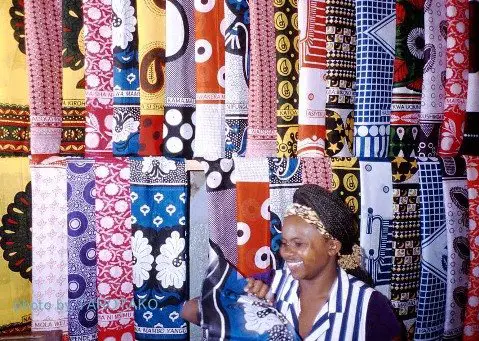Table of Contents
This got me curious about what my own current collection of kangas had to offer in terms of sayings.
Checking when I got home, I found that my kangas say:
- Siri si umbeya (A secret isn’t gossip)
- Mungu ndiye kimbilio letu (God is our refuge)
- Nemekuja kutembea sikuja kwa umbea (I have come to visit, I didn’t come to gossip)
- Kuomba si kupata mungu akipenda atakupa (To ask is not to get; if God wishes, he will give you)
- Muumbaji ni mmoja njoo tuishi pamoja (The Creater is one; come let’s live together)
- Upendo ni nuru ya maisha (Love is the light of life)
- Maisha ni kutafuta siyo kutafutana (Life is about seeking not going after each other)
Tell me, do you have a favorite kanga saying?
If so, what is it, what does it mean, and why do you like it so much?
If you are an avid kanga wearer but never pay much attention to the words written on them, how about checking now (and sharing) what’s written on your favorite kanga?
Does this saying in any way reflect something that’s going on in your life?
Let me know by leaving a comment below.
If you would like to know more about kanga, its history, or kanga sayings in general, then check out the following links: List of 254 Sayings on Khangas.
Otherwise, that’s it from me.
I wish you a great weekend and, as always, look forward to hearing what you have to say.
Until the next time,
Biche
Kanga sayings, known as methali za kanga or maneno ya kanga, are a distinctive feature of the colorful, patterned fabrics worn by women across East Africa, particularly in Kenya and Tanzania.
These sayings, usually printed along the border of the kanga, serve as a form of communication, allowing women to express emotions, share wisdom, and even send coded messages without speaking directly.
Kangas are not just garments; they are cultural artifacts that reflect the values, humor, and complexities of Swahili society.
The Origins and Significance of Kanga Sayings
The tradition of printing messages on kangas dates back to the early 20th century, when textile manufacturers in Tanzania and Kenya began incorporating Swahili proverbs, blessings, and expressions onto the fabric.
Initially, these messages were simple, but over time, they became more nuanced, reflecting social dynamics, relationships, and personal sentiments.
Kanga sayings are deeply embedded in East African culture, especially among Swahili-speaking communities. Women carefully choose kangas based on the message they wish to convey, whether it’s a personal statement, a response to gossip, or a blessing for a loved one. Since direct confrontation is often discouraged in traditional societies, kangas offer a way to express emotions subtly yet powerfully.
Themes in Kanga Sayings
Kanga sayings cover a wide range of themes, reflecting different aspects of life and social interaction.
Some of the most common categories include:
Maneno ya Kanga Theme #1. Love and Affection
Kangas are often exchanged as gifts between couples, family members, or friends.
Romantic and affectionate messages are common, especially in wedding ceremonies and engagements.
- Penzi ni kikohozi, halifichiki (Love is like a cough; it cannot be hidden).
- Nakupenda sana, usiniache (I love you very much, don’t leave me).
2. Wisdom and Life Lessons
Many kanga sayings draw from Swahili proverbs, offering guidance and reflections on life. These messages are used to share knowledge and remind others of important values.
- Mvumilivu hula mbivu (A patient person eats ripe fruit).
- Subira huvuta heri (Patience brings good fortune).
